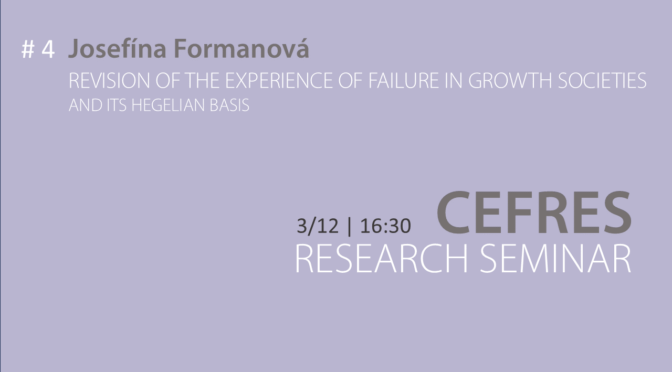Revision of the Experience of Failure in Growth Societies, and Its Hegelian Basis
4th session of CEFRES in-house seminar
Through the presentation of works in progress, CEFRES’s Seminar aims at raising and discussing issues about methods, approaches or concepts, in a multidisciplinary spirit, allowing everyone to confront her or his own perspectives with the research presented.
Location: CEFRES Library
Date: Tuesday, 3rd December, 2024 at 4:30 p.m.
Language: English
Contact / To register: cefres[@]cefres.cz
It wll be hosted by:
Josefína Formanová (Faculty of Arts, Charles University)
Chair: Ivan LANDA (Institute of Philosophy, Czech Academy of Sciences)
The following text will accompany our discussion:
Wiliiam DESMOND: “Philosophy and Failure” Journal of Speculative Philosophy, 1988, New Series, vol. 2. No. 4 (1988)
Abstract:
Contemporary social philosophy points out that consumerist late modern civilization lacks “the experience of threshold” (Deleuze 1990, Géryk 2023), and dwells in a mode of “dynamic stabilization” (Rosa 2005), which has, however, long-term destabilizing economic, ecological, social, and political consequences. Current society thus evolves ever more efficiently towards unlimited growth, and averts any constraints or enclosures. Nevertheless, ends and limits are generally of irreplaceable importance, as they enable us to overcome inequalities arising in different areas of society or ecosystems, and condition the possibility of effective reflection and even social change (Bělohradský 2007). In the end, the absence of limits may result in losing the meaning of growth, and the idea of progress may thus become but a normative stand, not responding to the general need for optimization of systemic structures anymore. With regard to such situation, it may be worth considering that the optimization or stabilization of individual and social modes of existence requires the revision of the experience of failure, which has long been devalued, rather than putting further blind trust into progress. In my presentation, I propose to conceive “failure” as a starting point for rehabilitation of the meaning of social thresholds and constraints, and of our experience with the world as a super-individual web of relations. The philosophical basis for this revision was already put forward by the father of modern philosophy, Georg W. F. Hegel, and is now taken up by the tradition of social and political philosophy, dedicated to the critique of meritocratic ethos, and the analysis of social recognition (e.g. Han 2010, Sandel, 2022). Following this tradition, I first present some principles of Hegel’s philosophy as the starting point for the construction of the notion of failure; and then I further develop this notion with regard to our current growth society.

